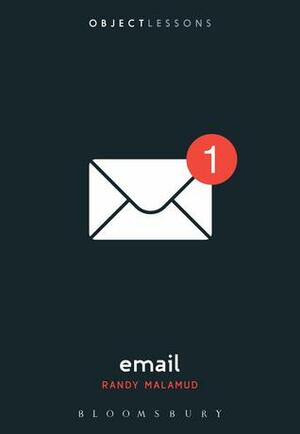
by Randy Malamud
Genres: Non-fictionPages: 184
Series: Object Lessons
Rating:

Synopsis:Do you feel your consciousness, your attention, and your intelligence (not to mention your eyesight) being sucked away, byte by byte, in a deadening tsunami of ill-composed blather, corporate groupthink, commercial come-ons, and other meaningless internet flotsam? Do your work life and your social life, hideously conjoined in your inbox, drag each other down in a surreal cycle of neverending reposts, appointments, and deadlines?
Sometime in the mid-1990s, we began, often with some trepidation, to enroll for a service that promised to connect us-electronically and efficiently-to our friends and lovers, our bosses and merchants. If it seemed at first like simply a change in scale (our mail would be faster, cheaper, more easily distributed to large groups), we now realize that email entails a more fundamental alteration in our communicative consciousness. Despite its fading relevance in the lives of the younger generation in the face of an ever-changing array of apps and media, email is probably here to stay, for better or worse.
Randy Malamud’s Email is a bit of a meditation on email and what it can be used for, with some glimpses into the history of the medium… but mostly it’s a little sceptical, a little dismissive. Now and then he gives into the wonder of the fact that we can almost immediately contact people all over the world and say anything… but mostly he harps on the fragmented focus, the lack of profundity, etc.
As someone who kept in contact with my now-wife mostly only through email for long months when they were teaching in a remote area in Finland, I think Malamud’s vision is sorely lacking. I had whole 100-email threads with friends full of ideas and chatter, which is the only reason I know that after 100 emails in a thread, Gmail starts a new one. I’ve written stories with other people going back and forth by email.
Of course I work with boring, transactional emails every day — and of course those emails aren’t wonders of the world. But I think there’s a lot more to it than Malamud’s willing to see, and more history he could’ve dug into. I know I always harp on about Personal Stereo and Blue Jeans as being my favourites so far from this series, but I crave more books like those two.
Rating: 2/5

His complaints make me wonder if he realizes the curated manner in which we now see letters doesn’t reflect the bulk of the letters sent in the past. Just like e-mail, plenty of letters were mundane and transactional. When those belonged to notable people, they sit in boxes in archives and no one looks at them and they certainly don’t include them in “Complete Works and Correspondence of Famous Person.” Which seems odd, considering he’s an English professor…
I think it’s one of those things where email is still so new the possibilities get dismissed.
If I should accidentally become famous somehow, there are definitely emails of mine that would seem interesting and worthy of note. Like some of the emails I sent to the staff of a, cough, certain website. XD Very revealing of my character and opinions.